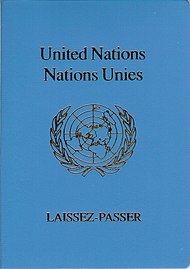| United Nations laissez-passer | |
|---|---|
 The front cover of a blue machine-readable United Nations laissez-passer. | |
| Type | laissez-passer |
| Issued by | United Nations and the International Labour Organization |
| Purpose | Identification |
| Eligibility | UN officials and officials of the United Nations Specialized Agencies and the IAEA |
| Size | 88 mm × 125 mm (3.5 in × 4.9 in) |
| United Nations laissez-passer | |
|---|---|
 The front cover of a red machine-readable United Nations laissez-passer. | |
| Type | laissez-passer |
| Issued by | United Nations |
| Purpose | Identification |
| Eligibility | High UN officials and Directors of the United Nations Specialized Agencies and the IAEA |
| Size | 88 mm × 125 mm (3.5 in × 4.9 in) |
A United Nations laissez-passer (UNLP or LP) is a diplomatic travel document issued by the United Nations under the provisions of Article VII of the 1946 Convention on the Privileges and Immunities of the United Nations[1] in its offices in New York City and Geneva, as well as by the International Labour Organization (ILO).[2]
The UNLP is issued to UN and ILO staff as well as staff members of international organizations such as the WHO, the IAEA, the World Tourism Organization, the Comprehensive Nuclear-Test-Ban Treaty Organization Preparatory Commission, the Organisation for the Prohibition of Chemical Weapons, the World Trade Organization, the International Monetary Fund, the International Organization for Migration, the World Intellectual Property Organization and the World Bank. The document is written in English and French, working languages of United Nations.
The UNLP is a valid travel document, which can be used like a national passport (in connection with travel on official missions only).
Most officials hold a blue UNLP (up to D-1 level), which is similar in legal status to a service passport. A red UNLP is issued to particularly high officials (D-2[a] and above[b]), and confers similar status to that of a diplomatic passport holder.
- ^ "Convention on the privileges and immunities of the United Nations" (PDF). United Nations (in English and French). 1946-02-13. Archived (PDF) from the original on 2021-10-13. Retrieved 2022-03-10.
- ^ Münch, Wolfgang; Tang, Guangting; Wynes, M. Deborah (2005). "Review of the Management of the United Nations Laissez-passer" (PDF). Joint Inspection Unit, UN. Archived (PDF) from the original on 2020-10-27. Retrieved 2022-03-09.
Cite error: There are <ref group=lower-alpha> tags or {{efn}} templates on this page, but the references will not show without a {{reflist|group=lower-alpha}} template or {{notelist}} template (see the help page).